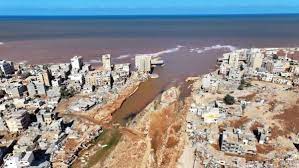The devastating hurricane Danial ruined conflict-ridden Libya as the rain thrust the desert into an ocean about a week ago. Unfortunately, the storm was followed by the collapse of two dams that killed thousands of people washing whole neighbourhoods into the Mediterranean Sea. Death tolls reached up to 11,000, search and rescue activities are in progress and a large number of people are still missing from their homes. The Mayor of the submerged city of Derna has warned that the death toll could reach 20,000 casualties, as many victims’ bodies have been swept out to sea and their recovery would not be possible.
In the aftermath of deadly floods, there have been widespread allegations that the two dams that collapsed were not well-maintained by the authorities. While the fateful incidents of dams’ wreckage broke out a nationwide debate about contradictory reports passed on by the warring governments ruling parts of the conflict-ridden nation. The residents complained that they had received mixed messages from the two rival governments on whether they should stay home or leave the area. Meanwhile, some took the evacuation call as an exaggeration of the situation and opted to stay home until a fateful calamity caught them in their homes.
Historically, the Afro- Arab nation has been in a state of volatility and choas over the past decade. The waning days of the oil-rich Libyan nation first started when a uniformed military officer Colonel Mu’ ammar Al-Qaddafi took control of the country through a successful military coup in the late 60s. Later, the Kismat of Libyan people further saw dreadfulness when Al-Qaddafi subdued before the pro-west International Atomic Energy Agency (IAEA) in early 2003 and handed over his defence arsenal to the global nuclear watchdog. Al-Qaddafi’s move not only paved the path for his ouster from power but proved to be disastrous for Liya’s political stability and territorial integrity in the following years. Currently, Libya is governed by two warring factions, one the UN-backed administration based in the capital Tripoli and the other Egyptian-supported group based in Benghazi. Awfully, one government ordered the public for evacuation and the other asked them to stay home. Earlier, thousands of Libyans were killed in the tussle of their rulers and now countless drowned as the result of their complicity. In fact, Libyans chose mutual enmity over alliance and took arms against each other instead of joining hands against their common enemy. So, nature was displeased with them and disunity ruined their nation so far.







